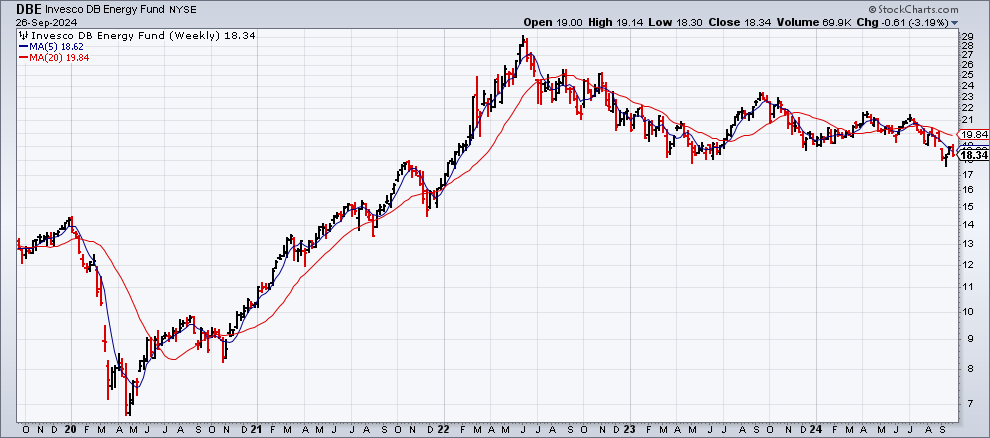The case for categorizing commodities as one asset class has always been a shaky affair based on convenience rather than logic. The economic factors driving prices of specific types of raw materials varies widely and so a more nuanced view from an asset allocation perspective is compelling. Recent market trends tell the story.
Energy may be second to none in terms of an economic footprint in the commodities space, but its influence across the asset class – if we can call it that – is limited. That’s especially true in recent history. As energy commodities stumble, prices are rallying elsewhere.
The implication: carving out an asset allocation to commodities deserves a more granular approach vs. holding a wide set of markets in one fund. For perspective, here’s a quick rundown of several commodities ETFs managed by Invesco. Note: the charts below reflect weekly frequency.
Let’s begin with energy (DBE), which is dominated by crude oil and gasoline prices and has been trending lower for the better part of two years. The weak trend in energy casts a long shadow over a number of broadly defined commodities funds that are heavily influenced by energy on the reasoning that these commodities are critical for global economic activity.
Precious metals (DBP), by contrast, have been rallying for the past two years. The dominant holding here is gold, which rose to another record high on Thursday at nearly $2,695 an ounce.
Agricultural commodities (DBA) are also enjoying an extending uptrend.
Meanwhile, industrial metals (DBB) have been a trading range over the past two years.
Invesco’s spin on a broad commodities portfolio (DBC) reflects a relatively mild but conspicuous decline. Comparable ETFs from other issuers show a similar downside bias.
The main takeaway: putting commodities into a single asset-class category may be useful from the 30,000-foot view, but in terms of practical trading/investing strategies the broad-brush approach blurs lots of details that are arguably crucial for analyzing this corner of global markets. Putting all the eggs in one basket, in sum, comes with a lot of baggage on this front.
Learn To Use R For Portfolio Analysis
Quantitative Investment Portfolio Analytics In R:
An Introduction To R For Modeling Portfolio Risk and Return
By James Picerno




